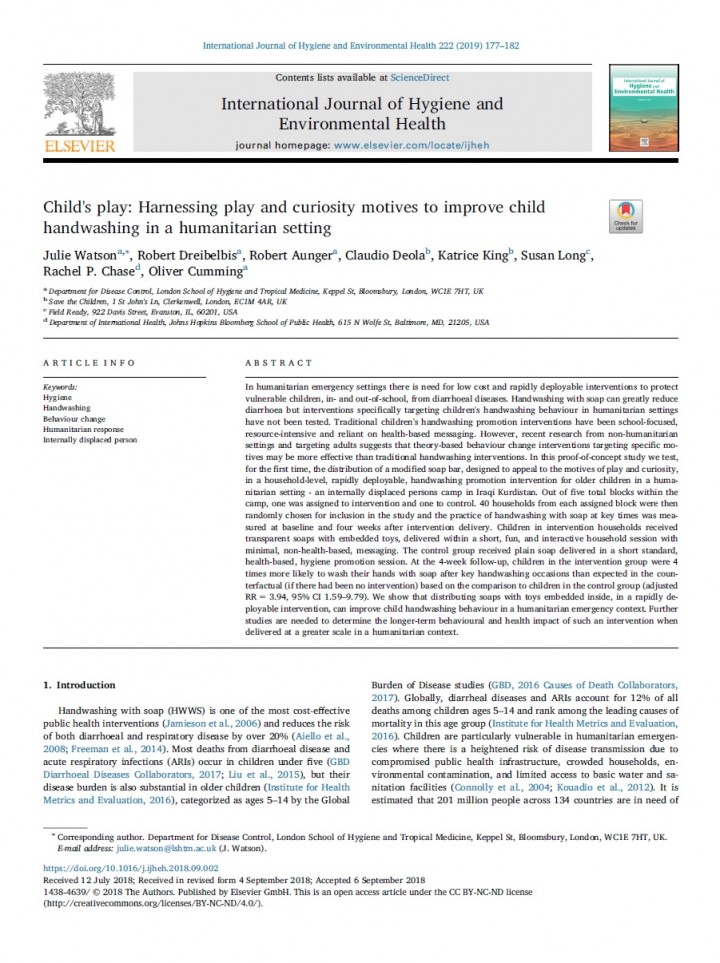Child's Play: Harnessing Play and Curiosity Motives to Improve Child Handwashing in a Humanitarian Setting
Watson, J., Dreibelbis, R., Aunger, R., Deola, C., King, K., Long, S., Chase, R. P., Cumming, O. (2018)

Published in: 2018
Pages: 6
Publisher:
Elsevier GmbH
Author:
Watson, J., Dreibelbis, R., Aunger, R., Deola, C., King, K., Long, S., Chase, R. P., Cumming, O.
Uploaded by:
SuSanA Admin
Partner profile:
common upload
676 Views
4 Downloads
Abstract
In humanitarian emergency settings there is need for low cost and rapidly deployable interventions to protect vulnerable children, in- and out-of-school, from diarrhoeal diseases. Handwashing with soap can greatly reduce diarrhoea but interventions specifically targeting children's handwashing behaviour in humanitarian settings have not been tested. Traditional children's handwashing promotion interventions have been school-focused, resource-intensive and reliant on health-based messaging. However, recent research from non-humanitarian settings and targeting adults suggests that theory-based behaviour change interventions targeting specific motives may be more effective than traditional handwashing interventions. In this proof-of-concept study we test, for the first time, the distribution of a modified soap bar, designed to appeal to the motives of play and curiosity, in a household-level, rapidly deployable, handwashing promotion intervention for older children in a humanitarian setting - an internally displaced persons camp in Iraqi Kurdistan. Out of five total blocks within the camp, one was assigned to intervention and one to control. 40 households from each assigned block were then randomly chosen for inclusion in the study and the practice of handwashing with soap at key times was measured at baseline and four weeks after intervention delivery. Children in intervention households received transparent soaps with embedded toys, delivered within a short, fun, and interactive household session with minimal, non-health-based, messaging. The control group received plain soap delivered in a short standard, health-based, hygiene promotion session. At the 4-week follow-up, children in the intervention group were 4 times more likely to wash their hands with soap after key handwashing occasions than expected in the counterfactual (if there had been no intervention) based on the comparison to children in the control group (adjusted RR = 3.94, 95% CI 1.59–9.79). We show that distributing soaps with toys embedded inside, in a rapidly deployable intervention, can improve child handwashing behaviour in a humanitarian emergency context. Further studies are needed to determine the longer-term behavioural and health impact of such an intervention when delivered at a greater scale in a humanitarian context.
Bibliographic information
Watson, J., Dreibelbis, R., Aunger, R., Deola, C., King, K., Long, S., Chase, R. P., Cumming, O. (2018). Child's Play: Harnessing Play and Curiosity Motives to Improve Child Handwashing in a Humanitarian Setting. Elsevier GmbH
Filter tags
English















